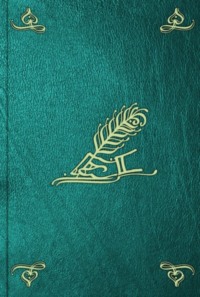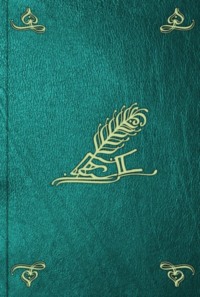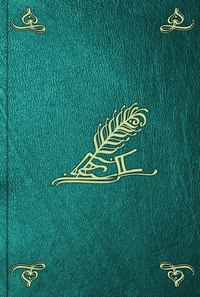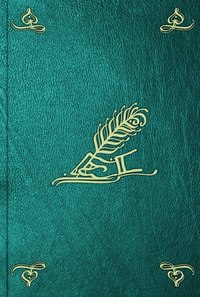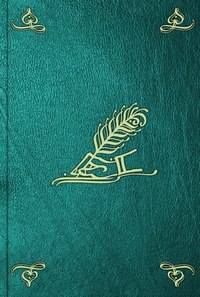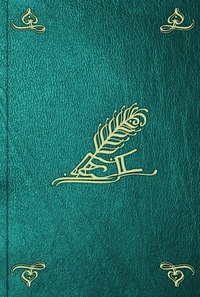 полная версия
полная версияMore Letters of Charles Darwin — Volume 1
If you should at any time do me the favour of writing to me, I should be very much obliged if you would inform me whether you have yourself examined Brehm's subspecies of birds; for I have looked through some of his writings, but have never met an ornithologist who believed in his {illegible}. Are these subspecies really characteristic of certain different regions of Germany?
Should you write, I should much like to know how the German edition sells.
LETTER 116. TO J.S. HENSLOW. October 26th {1860}.
Many thanks for your note and for all the trouble about the seeds, which will be most useful to me next spring. On my return home I will send the shillings. (116/1. Shillings for the little girls in Henslow's parish who collected seeds for Darwin.) I concluded that Dr. Bree had blundered about the Celts. I care not for his dull, unvarying abuse of me, and singular misrepresentation. But at page 244 he in fact doubts my deliberate word, and that is the act of a man who has not the soul of a gentleman in him. Kingsley is "the celebrated author and divine" (116/2. "Species not Transmutable," by C.R. Bree. After quoting from the "Origin," Edition II., page 481, the words in which a celebrated author and divine confesses that "he has gradually learnt to see that it is just as noble a conception of the Deity to believe that He created a few original forms, etc.," Dr. Bree goes on: "I think we ought to have had the name of this divine given with this remarkable statement. I confess that I have not yet fully made up my mind that any divine could have ever penned lines so fatal to the truths he is called upon to teach.") whose striking sentence I give in the second edition with his permission. I did not choose to ask him to let me use his name, and as he did not volunteer, I had of course no choice. (116/3. We are indebted to Mr. G.W. Prothero for calling our attention to the following striking passage from the works of a divine of this period: — "Just a similar scepticism has been evinced by nearly all the first physiologists of the day, who have joined in rejecting the development theories of Lamarck and the 'Vestiges'...Yet it is now acknowledged under the high sanction of the name of Owen that 'creation' is only another name for our ignorance of the mode of production...while a work has now appeared by a naturalist of the most acknowledged authority, Mr. Darwin's masterly volume on the 'Origin of Species,' by the law of 'natural selection,' which now substantiates on undeniable grounds the very principle so long denounced by the first naturalists — the origination of new species by natural causes: a work which must soon bring about an entire revolution of opinion in favour of the grand principle of the self-evolving powers of nature." — Prof. Baden Powell's "Study of the Evidences of Christianity," "Essays and Reviews," 7th edition, 1861 (pages 138, 139).)
Dr. Freke has sent me his paper, which is far beyond my scope — something like the capital quiz in the "Anti-Jacobin" on my grandfather, which was quoted in the "Quarterly Review."
LETTER 117. TO D.T. ANSTED.
(117/1. The following letter was published in Professor Meldola's presidential address to the Entomological Society, 1897, and to him we are indebted for a copy.)
15, Marine Parade, Eastbourne, October 27th {1860}.
As I am away from home on account of my daughter's health, I do not know your address, and fly this at random, and it is of very little consequence if it never reaches you.
I have just been reading the greater part of your "Geological Gossip," and have found part very interesting; but I want to express my admiration at the clear and correct manner in which you have given a sketch of Natural Selection. You will think this very slight praise; but I declare that the majority of readers seem utterly incapable of comprehending my long argument. Some of the reviewers, who have servilely stuck to my illustrations and almost to my words, have been correct, but extraordinarily few others have succeeded. I can see plainly, by your new illustrations and manner and order of putting the case, that you thoroughly comprehend the subject. I assure you this is most gratifying to me, and it is the sole way in which the public can be indoctrinated. I am often in despair in making the generality of NATURALISTS even comprehend me. Intelligent men who are not naturalists and have not a bigoted idea of the term species, show more clearness of mind. I think that you have done the subject a real service, and I sincerely thank you. No doubt there will be much error found in my book, but I have great confidence that the main view will be, in time, found correct; for I find, without exception, that those naturalists who went at first one inch with me now go a foot or yard with me.
This note obviously requires no answer.
LETTER 118. TO H.W. BATES. Down, November 22nd {1860}.
I thank you sincerely for writing to me and for your very interesting letter. Your name has for very long been familiar to me, and I have heard of your zealous exertions in the cause of Natural History. But I did not know that you had worked with high philosophical questions before your mind. I have an old belief that a good observer really means a good theorist (118/1. For an opposite opinion, see Letter 13.), and I fully expect to find your observations most valuable. I am very sorry to hear that your health is shattered; but I trust under a healthy climate it may be restored. I can sympathise with you fully on this score, for I have had bad health for many years, and fear I shall ever remain a confirmed invalid. I am delighted to hear that you, with all your large practical knowledge of Natural History, anticipated me in many respects and concur with me. As you say, I have been thoroughly well attacked and reviled (especially by entomologists — Westwood, Wollaston, and A. Murray have all reviewed and sneered at me to their hearts' content), but I care nothing about their attacks; several really good judges go a long way with me, and I observe that all those who go some little way tend to go somewhat further. What a fine philosophical mind your friend Mr. Wallace has, and he has acted, in relation to me, like a true man with a noble spirit. I see by your letter that you have grappled with several of the most difficult problems, as it seems to me, in Natural History — such as the distinctions between the different kinds of varieties, representative species, etc. Perhaps I shall find some facts in your paper on intermediate varieties in intermediate regions, on which subject I have found remarkably little information. I cannot tell you how glad I am to hear that you have attended to the curious point of equatorial refrigeration. I quite agree that it must have been small; yet the more I go into that question the more convinced I feel that there was during the Glacial period some migration from north to south. The sketch in the "Origin" gives a very meagre account of my fuller MS. essay on this subject.
I shall be particularly obliged for a copy of your paper when published (118/2. Probably a paper by Bates entitled "Contributions to an Insect Fauna of the Amazon Valley" ("Trans. Entomol. Soc." Volume V., page 335, 1858-61).); and if any suggestions occur to me (not that you require any) or questions, I will write and ask.
I have at once to prepare a new edition of the "Origin," (118/3. Third Edition, March, 1861.), and I will do myself the pleasure of sending you a copy; but it will be only very slightly altered.
Cases of neuter ants, divided into castes, with intermediate gradations (which I imagine are rare) interest me much. See "Origin" on the driver-ant, page 241 (please look at the passage.)
LETTER 119. TO T.H. HUXLEY.
(119/1. This refers to the first number of the new series of the "Natural History Review," 1861, a periodical which Huxley was largely instrumental in founding, and of which he was an editor (see Letter 107). The first series was published in Dublin, and ran to seven volumes between 1854 and 1860. The new series came to an end in 1865.)
Down, January, 3rd {1861}.
I have just finished No. 1 of the "Natural History Review," and must congratulate you, as chiefly concerned, on its excellence. The whole seems to me admirable, — so admirable that it is impossible that other numbers should be so good, but it would be foolish to expect it. I am rather a croaker, and I do rather fear that the merit of the articles will be above the run of common readers and subscribers. I have been much interested by your brain article. (119/2. The "Brain article" of Huxley bore the title "On the Zoological Relations of Man with the Lower Animals," and appeared in No. 1, January 1861, page 67. It was Mr. Huxley's vindication of the unqualified contradiction given by him at the Oxford meeting of the British Association to Professor Owen's assertions as to the difference between the brains of man and the higher apes. The sentence omitted by Owen in his lecture before the University of Cambridge was a footnote on the close structural resemblance between Homo and Pithecus, which occurs in his paper on the characters of the class Mammalia in the "Linn. Soc. Journal," Volume II., 1857, page 20. According to Huxley the lecture, or "Essay on the Classification of the Mammalia," was, with this omission, a reprint of the Linnean paper. In "Man's Place in Nature," page 110, note, Huxley remarks: "Surely it is a little singular that the 'anatomist,' who finds it 'difficult' to 'determine the difference' between Homo and Pithecus, should yet range them, on anatomical grounds, in distinct sub-classes.") What a complete and awful smasher (and done like a "buttered angel") it is for Owen! What a humbug he is to have left out the sentence in the lecture before the orthodox Cambridge dons! I like Lubbock's paper very much: how well he writes. (119/3. Sir John Lubbock's paper was a review of Leydig on the Daphniidae. M'Donnell's was "On the Homologies of the Electric Organ of the Torpedo," afterwards used in the "Origin" (see Edition VI., page 150).) M'Donnell, of course, pleases me greatly. But I am very curious to know who wrote the Protozoa article: I shall hear, if it be not a secret, from Lubbock. It strikes me as very good, and, by Jove, how Owen is shown up — "this great and sound reasoner"! By the way, this reminds me of a passage which I have just observed in Owen's address at Leeds, which a clever reviewer might turn into good fun. He defines (page xc) and further on amplifies his definition that creation means "a process he knows not what." And in a previous sentence he says facts shake his confidence that the Apteryx in New Zealand and Red Grouse in England are "distinct creations." So that he has no confidence that these birds were produced by "processes he knows not what!" To what miserable inconsistencies and rubbish this truckling to opposite opinions leads the great generaliser! (119/4. In the "Historical Sketch," which forms part of the later editions of the "Origin," Mr. Darwin made use of Owen's Leeds Address in the manner sketched above. See "Origin," Edition VI., page xvii.)
Farewell: I heartily rejoice in the clear merit of this number. I hope Mrs. Huxley goes on well. Etty keeps much the same, but has not got up to the same pitch as when you were here. Farewell.
LETTER 120. TO JAMES LAMONT. Down, February 25th {1861}.
I am extremely much obliged for your very kind present of your beautiful work, "Seasons with the Sea-Horses;" and I have no doubt that I shall find much interesting from so careful and acute an observer as yourself. (120/1. "Seasons with the Sea-Horses; or, Sporting Adventures in the Northern Seas." London, 1861. Mr. Lamont (loc. cit., page 273) writes: "The polar bear seems to me to be nothing more than a variety of the bears inhabiting Northern Europe, Asia, and America; and it surely requires no very great stretch of the imagination to suppose that this variety was originally created, not as we see him now, but by individuals of Ursus arctos in Siberia, who, finding their means of subsistence running short, and pressed by hunger, ventured on the ice and caught some seals. These individuals would find that they could make a subsistence in this way, and would take up their residence on the shore and gradually take to a life on the ice...Then it stands to reason that those individuals who might happen to be palest in colour would have the best chance of succeeding in surprising seals...The process of Natural Selection would do the rest, and Ursus arctos would in the course of a few thousands, or a few millions of years, be transformed into the variety at present known as Ursus maritimus." The author adds the following footnote (op. cit., page 275): "It will be obvious to any one that I follow Mr. Darwin in these remarks; and, although the substance of this chapter was written in Spitzbergen, before "The Origin of Species" was published, I do not claim any originality for my views; and I also cheerfully acknowledge that, but for the publication of that work in connection with the name of so distinguished a naturalist, I never would have ventured to give to the world my own humble opinions on the subject.")
P.S. I have just been cutting the leaves of your book, and have been very much pleased and surprised at your note about what you wrote in Spitzbergen. As you thought it out independently, it is no wonder that you so clearly understand Natural Selection, which so few of my reviewers do or pretend not to do.
I never expected to see any one so heroically bold as to defend my bear illustration. (120/2. "In North America the black bear was seen by Hearne swimming for hours with widely open mouth, thus catching, almost like a whale, insects in the water." — "Origin," Edition VI., page 141. See Letter 110.) But a man who has done all that you have done must be bold! It is laughable how often I have been attacked and misrepresented about this bear. I am much pleased with your remarks, and thank you cordially for coming to the rescue.
LETTER 121. TO W.B. TEGETMEIER.
(121/1. Mr. Darwin's letters to Mr. Tegetmeier, taken as a whole, give a striking picture of the amount of assistance which Darwin received from him during many years. Some citations from these letters given in "Life and Letters," II., pages 52, 53, show how freely and generously Mr. Tegetmeier gave his help, and how much his co-operation was valued.
The following letter is given as an example of the questions on which Darwin sought Mr. Tegetmeier's opinion and guidance.)
Down, March 22 {1861}.
I ought to have answered your last note sooner; but I have been very busy. How wonderfully successful you have been in breeding Pouters! You have a good right to be proud of your accuracy of eye and judgment. I am in the thick of poultry, having just commenced, and shall be truly grateful for the skulls, if you can send them by any conveyance to the Nag's Head next Thursday.
You ask about vermilion wax: positively it was not in the state of comb, but in solid bits and cakes, which were thrown with other rubbish not far from my hives. You can make any use of the fact you like. Combs could be concentrically and variously coloured and dates recorded by giving for a few days wax darkly coloured with vermilion and indigo, and I daresay other substances. You ask about my crossed fowls, and this leads me to make a proposition to you, which I hope cannot be offensive to you. I trust you know me too well to think that I would propose anything objectionable to the best of my judgment. The case is this: for my object of treating poultry I must give a sketch of several breeds, with remarks on various points. I do not feel strong on the subject. Now, when my MS. is fairly copied in an excellent handwriting, would you read it over, which would take you at most an hour or two, and make comments in pencil on it; and accept, like a barrister, a fee, we will say, of a couple of guineas. This would be a great assistance to me, specially if you would allow me to put a note, stating that you, a distinguished judge and fancier, had read it over. I would state that you doubted or concurred, as each case might be, of course striking out what you were sure was incorrect. There would be little new in my MS. to you; but if by chance you used any of my facts or conclusions before I published, I should wish you to state that they were on my authority; otherwise I shall be accused of stealing from you. There will be little new, except that perhaps I have consulted some out-of-the-way books, and have corresponded with some good authorities. Tell me frankly what you think of this; but unless you will oblige me by accepting remuneration, I cannot and will not give you such trouble. I have little doubt that several points will arise which will require investigation, as I care for many points disregarded by fanciers; and according to any time thus spent, you will, I trust, allow me to make remuneration. I hope that you will grant me this favour. There is one assistance which I will now venture to beg of you — viz., to get me, if you can, another specimen of an old white Angora rabbit. I want it dead for the skeleton; and not knocked on the head. Secondly, I see in the "Cottage Gardener" (March 19th, page 375) there are impure half-lops with one ear quite upright and shorter than the other lopped ear. I much want a dead one. Baker cannot get one. Baily is looking out; but I want two specimens. Can you assist me, if you meet any rabbit-fancier? I have had rabbits with one ear more lopped than the other; but I want one with one ear quite upright and shorter, and the other quite long and lopped.
LETTER 122. TO H.W. BATES. Down, March 26th {1861}.
I have read your papers with extreme interest, and I have carefully read every word of them. (122/1. "Contributions to an Insect Fauna of the Amazon Valley." (Read March 5th and November 24th, 1860). "Entomological Soc. Trans." V., pages 223 and 335).) They seem to me to be far richer in facts of variation, and especially on the distribution of varieties and subspecies, than anything which I have read. Hereafter I shall re-read them, and hope in my future work to profit by them and make use of them. The amount of variation has much surprised me. The analogous variation of distinct species in the same regions strikes me as particularly curious. The greater variability of the female sex is new to me. Your Guiana case seems in some degree analogous, as far as plants are concerned, with the modern plains of La Plata, which seem to have been colonised from the north, but the species have been hardly modified. (122/2. Mr. Bates (page 349) gives reason to believe that the Guiana region should be considered "a perfectly independent province," and that it has formed a centre "whence radiated the species which now people the low lands on its borders.")
Would you kindly answer me two or three questions if in your power? When species A becomes modified in another region into a well-marked form C, but is connected with it by one (or more) gradational forms B inhabiting an intermediate region; does this form B generally exist in equal numbers with A and C, OR INHABIT AN EQUALLY LARGE AREA? The probability is that you cannot answer this question, though one of your cases seems to bear on it...
You will, I think, be glad to hear that I now often hear of naturalists accepting my views more or less fully; but some are curiously cautious in running the risk of any small odium in expressing their belief.
LETTER 123. TO H.W. BATES. Down, April 4th {1861}.
I have been unwell, so have delayed thanking you for your admirable letter. I hope you will not think me presumptuous in saying how much I have been struck with your varied knowledge, and with the decisive manner in which you bring it to bear on each point, — a rare and most high quality, as far as my experience goes. I earnestly hope you will find time to publish largely: before the Linnean Society you might bring boldly out your views on species. Have you ever thought of publishing your travels, and working in them the less abstruse parts of your Natural History? I believe it would sell, and be a very valuable contribution to Natural History. You must also have seen a good deal of the natives. I know well it would be quite unreasonable to ask for any further information from you; but I will just mention that I am now, and shall be for a long time, writing on domestic varieties of all animals. Any facts would be useful, especially any showing that savages take any care in breeding their animals, or in rejecting the bad and preserving the good; or any fancies which they may have that one coloured or marked dog, etc., is better than another. I have already collected much on this head, but am greedy for facts. You will at once see their bearing on variation under domestication.
Hardly anything in your letter has pleased me more than about sexual selection. In my larger MS. (and indeed in the "Origin" with respect to the tuft of hairs on the breast of the cock-turkey) I have guarded myself against going too far; but I did not at all know that male and female butterflies haunted rather different sites. If I had to cut up myself in a review I would have {worried?} and quizzed sexual selection; therefore, though I am fully convinced that it is largely true, you may imagine how pleased I am at what you say on your belief. This part of your letter to me is a quintessence of richness. The fact about butterflies attracted by coloured sepals is another good fact, worth its weight in gold. It would have delighted the heart of old Christian C. Sprengel — now many years in his grave.
I am glad to hear that you have specially attended to "mimetic" analogies — a most curious subject; I hope you publish on it. I have for a long time wished to know whether what Dr. Collingwood asserts is true — that the most striking cases generally occur between insects inhabiting the same country.
LETTER 124. TO F.W. HUTTON. Down, April 20th {1861}.
I hope that you will permit me to thank you for sending me a copy of your paper in "The Geologist" (124/1. In a letter to Hooker (April 23rd?, 1861) Darwin refers to Hutton's review as "very original," and adds that Hutton is "one of the very few who see that the change of species cannot be directly proved..." ("Life and Letters," II., page 362). The review appeared in "The Geologist" (afterwards known as "The Geological Magazine") for 1861, pages 132-6 and 183-8. A letter on "Difficulties of Darwinism" is published in the same volume of "The Geologist," page 286.), and at the same time to express my opinion that you have done the subject a real service by the highly original, striking, and condensed manner with which you have put the case. I am actually weary of telling people that I do not pretend to adduce direct evidence of one species changing into another, but that I believe that this view in the main is correct, because so many phenomena can be thus grouped together and explained. But it is generally of no use; I cannot make persons see this. I generally throw in their teeth the universally admitted theory of the undulation of light, — neither the undulation nor the very existence of ether being proved, yet admitted because the view explains so much. You are one of the very few who have seen this, and have now put it most forcibly and clearly. I am much pleased to see how carefully you have read my book, and, what is far more important, reflected on so many points with an independent spirit. As I am deeply interested in the subject (and I hope not exclusively under a personal point of view) I could not resist venturing to thank you for the right good service which you have done.
I need hardly say that this note requires no answer.
LETTER 125. TO J.D. HOOKER.
(125/1. Parts of this letter are published in "Life and Letters," II., page 362.)
Down, {April} 23rd, {1861}.
I have been much interested by Bentham's paper in the "Natural History Review," but it would not, of course, from familiarity, strike you as it did me. (125/2. This refers to Bentham's paper "On the Species and Genera of Plants, etc." "Nat. Hist. Review," April, 1861, page 133, which is founded on, or extracted from, a paper read before the Linn. Soc., November 15th, 1858. It had been originally set down to be read on July 1st, 1858, but gave way to the papers of Darwin and Wallace. Mr. Bentham has described ("Life and Letters," II., page 294) how he reluctantly cancelled the parts urging "original fixity" of specific type, and the remainder seems not to have been published except in the above-quoted paper in the "Nat. Hist. Review.") I liked the whole — all the facts on the nature of close and varying species. Good Heavens! to think of the British botanists turning up their noses and saying that he knows nothing of British plants! I was also pleased at his remarks on classification, because it showed me that I wrote truly on this subject in the "Origin." I saw Bentham at the Linnean Society, and had some talk with him and Lubbock and Edgeworth, Wallich, and several others. I asked Bentham to give us his ideas of species; whether partially with us or dead against us, he would write excellent matter. He made no answer, but his manner made me think he might do so if urged — so do you attack him. Every one was speaking with affection and anxiety of Henslow. I dined with Bell at the Linnean Club, and liked my dinner...dining-out is such a novelty to me that I enjoyed it. Bell has a real good heart. I liked Rolleston's paper, but I never read anything so obscure and not self-evident as his "canons." (125/3. See "Nat. Hist. Review," 1861, page 206. The paper is "On the Brain of the Orang Utang," and forms part of the bitter controversy of this period to which reference occurs in letters to Huxley and elsewhere in these volumes. Rolleston's work is quoted by Huxley ("Man's Place in Nature," page 117) as part of the crushing refutation of Owen's position. Mr. Huxley's letter referred to above is no doubt that in the "Athenaeum," April 13th, 1861, page 498; it is certainly severe, but to those who know Mr. Huxley's "Succinct History of the Controversy," etc. ("Man's Place in Nature," page 113), it will not seem too severe.) I had a dim perception of the truth of your profound remark — that he wrote in fear and trembling "of God, man, and monkeys," but I would alter it into "God, man, Owen, and monkeys." Huxley's letter was truculent, and I see that every one thinks it too truculent; but in simple truth I am become quite demoniacal about Owen — worse than Huxley; and I told Huxley that I should put myself under his care to be rendered milder. But I mean to try and get more angelic in my feelings; yet I never shall forget his cordial shake of the hand, when he was writing as spitefully as he possibly could against me. But I have always thought that you have more cause than I to be demoniacally inclined towards him. Bell told me that Owen says that the editor mutilated his article in the "Edinburgh Review" (125/4. This is the only instance, with which we are acquainted, of Owen's acknowledging the authorship of the "Edinburgh Review" article.), and Bell seemed to think it was rendered more spiteful by the Editor; perhaps the opposite view is as probable. Oh, dear! this does not look like becoming more angelic in my temper!



